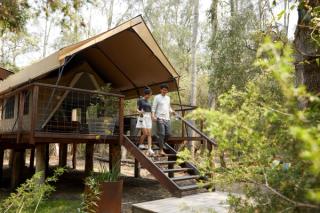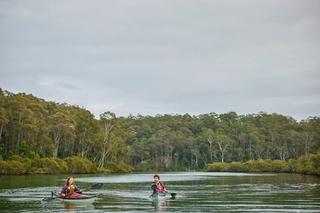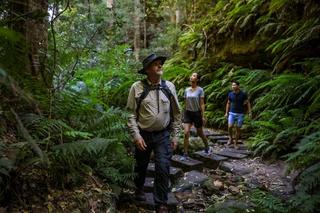What is sustainable tourism?
Sustainable tourism takes full account of its current and future economic, social and environmental impacts, addressing the needs of visitors, the industry, the environment and host communities.
Sustainable tourism refers to reducing impact and applying sustainable practices in all parts of the tourism supply chain. [1]
89% of travellers are likely to choose sustainable travel options for their next trip. [2]
How is sustainable tourism different to ecotourism, nature-based tourism and responsible travel?
Ecotourism focuses primarily on experiencing and learning about nature and is ethically managed to be low-impact and locally oriented. It contributes to the conservation or preservation of natural areas. [3]
Nature-based tourism is travelling to enjoy nature.
Responsible travel is the behaviour and style of individual travellers who make a positive impact on a destination.
Quick tips: Start small with steps every visitor economy business can take
- Make a commitment to include sustainable actions in your business plan.
- Include an Acknowledgement of Country on your website, marketing material and email signature to respect the local Aboriginal culture.
- Collect information on how much energy your business uses and how much waste it creates. Use a simple chart to record this on a weekly and/or monthly basis. This will allow you to track your progress.
- Review how you are reducing your environmental footprint e.g., waste recycling. Identify areas for improvement such as purchasing local materials with less packaging or that require less transportation to your business.
- Set some simple targets, such as reducing your water usage by 20 per cent in six months.
- Use products and equipment that have high star energy and water ratings.
- Turn appliances off when they are not in use.
- Provide digital statements, invoices and marketing materials instead of paper.
- Aim to recycle everything you cannot reuse.
- Work with suppliers who source their materials ethically and sustainably.
- Partner with a charity or organisation which gives back to your local community.
- Celebrate your sustainability achievements with your staff and share your actions with visitors and business colleagues.

Quick tips: Create sustainable experiences
As you progress on your path to sustainability, there are some specific opportunities related to the type of experience you offer to visitors.
Accommodation
- Develop an Environmental Management System (EMS). This will help you to start a systematic approach to monitor and improve your environmental performance over time.
- Set targets, identify priority areas for action, allocate responsibilities and monitor your progress.
- Harvest rainwater, fix leaking taps or pipes and install water-friendly shower heads to save water.
- Reduce energy consumption by turning air conditioners down (or off), installing lighting sensors, LED lighting, insulation and green power.
- Provide a digital compendium for your visitors instead of a hard copy visitor book or folder.
- Use refillable, biodegradable amenity bottles in your rooms.
- Offer Electric Vehicle (EV) charging stations and use an EV or hybrid vehicle for your business.
- Where possible, encourage visitors to use natural ventilation in their rooms.
- Offer visitors the option to not have a daily towel and sheet service.
- Establish an organic worm waste management system.
- Donate unused food to organisations such as OzHarvest or Foodbank.
- Encourage visitors to plant a tree on your property or donate to organisations such as Landcare Australia or Greening Australia.
Tours, activities and attractions
- Have a sustainable management plan that can be used to guide all the activities undertaken during a tour including rubbish removal.
- Eliminate use of single-use plastics and provide visitors with a branded, reusable drink bottle or cup.
- Consider sustainable transport options for your business such as electric or hybrid vehicles, e-bikes or electric-powered buggies.
- Use local materials and products and support local business services.
- Support land use and community conservation programs such as Take 3 for the Sea or WWF.
- Use oxybenzone-free sunscreen to help protect marine life and waterways.
- Ensure your tour and marketing materials do not promote feeding or touching native wildlife.
- Promote the sale of authentic arts, crafts and merchandise from local producers.
- Collaborate with First Nations People and suppliers via Supply Nation.
- Consider including citizen science projects in your experience, so visitors can get involved in collecting or analysing data on wildlife or plants on behalf of environmental organisations.

Quick tips: Reduce your business’ carbon footprint
A carbon footprint is the total amount of greenhouse gases, including carbon dioxide and methane, that are generated by our actions. [4]
- Use a benchmarked carbon calculator to measure your carbon footprint and understand how your business is performing against others.
- Make changes to your operations to minimise your carbon footprint.
- Buy carbon offsets to decrease your net emissions or offer this option to your visitors. For more information on carbon offsets and projects go to Climate Active and Carbon Market Institute Project Registry.

Quick tips: Share your sustainable experience
Once you have implemented sustainable initiatives in your business, share this aspect of the business with your staff, visitors, the media and travel distributors.
- Promote your membership of certification schemes and provide accurate information on your sustainability credentials across all your marketing channels, including your Australian Tourism Data Warehouse listing.
- Tell your visitors about your sustainable practices on your website before they arrive. Ensure you provide accurate information as visitors will expect to see these practices when they experience your product.
- Showcase the impacts and results from your sustainability initiatives on your website and social media channels. Focus on visitor or community benefits and outcomes.
- Provide behind-the-scenes tours or videos about your sustainable practices.
- Explain and teach your staff about what the business is doing so they can be advocates.
- Ensure your sustainability statement or policy is on your website.
- Let Destination NSW know about your sustainable practices via product@dnsw.com.au so we can communicate your initiatives via our consumer, media and trade channels.
81% of global travellers say sustainable travel is important to them. [5]
